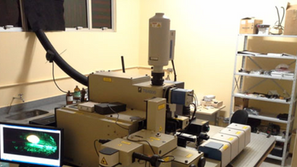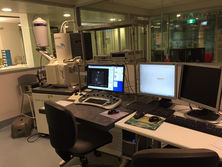Wake Forest University - the Nano and Quantum Technologies Laboratory

the Nano and Quantum Technologies Laboratory
Academics
NanoteQ
Living and Learning at Wake Forest University: The Graduate Student Experience
Welcome to the Kudzu League! Wake Forest University is a uniquely effective environment for PhD. training - judging by the success of our graduates. Wake's graduate programs emphasize strong adviser-advisee relationships, rigorous cross-disciplinary preparation, and the joy of discovery.
Wake's programs are focused, well funded, well resourced, and well recognized nationally and internationally. The graduate school is competitive with many programs in the top 15% of fields nationally according to multiple ranking sources. But, unlike large "mega-programs" where you are pigeon-holed, isolated, and invisible, Wake's size and focus means you are mentored as colleague, individually trained to excel in research, and prepared to be a leader within your scientific community.
NanoteQ...
NanoteQ is a large central research facility where researchers can get access to advanced research tools. This unique facility creates its own ecosystem where disciplinary barriers are lowered and programs are highly collaborative. Some of the things studied at the Lab are:
:
Materials Physics, Quantum Materials, Quantum information sciences, Nanobiomedical Tech, nano-biomedical engineering, bioelectronics, Organic device technology and green tech, Solar, and lighting applications.
Students at NanoteQ come from research groups in Physics, Chemistry, Biomedical Engineering, Computer Science and other departments.
What Makes Wake-NanoteQ Special?
1. An International Community of Learning
NanoteQ is a community of scientists from across the world that come here for the advanced capabilities of the Lab. This community includes Students, Visiting Scholars, Senior scientists and Guest researchers. The mix of interests and backgrounds yields a dynamic and exciting environment in which to do science; an environment where discoveries are made every day.
2. Regional Opportunities
NanoteQ sponsors a series of speakers, workshops, and residential conferences that allows us to better take advantage of the nearby research triangle around Raleigh...
and
WFU Physics Colloquia Series (thursdays at 3:30 pm in Olin Hall)
Regional Colloquia Series
http://www.ncsu.edu/chemistry/




3. A Dynamic Curriculum
An area in which NanoteQ consistently scores highly in the rankings - its curriculum. Here are a few of the recent courses taught at the Lab and that are rotated regularly.
PHY 656 Electron Imaging Science (1.5 credit hours)
This basic introduction to electron imaging covers the theory and practice of CTEM, HRTEM, and SEM. The course is structured around a set of lectures followed by illustrative laboratory exercises.
PHY 657 Scanning Probes (1.5 credit hours)
The theory and practice of scanning probes: STM, and AFM. Lectures followed with a lab component for hands-on learning. Permission of instructor required.
PHY 691/692 NANOTEQ Seminar (1.5 credit hours)
Intro to modern laboratory techniques such as XPS, Auger, analytical TEM, etc. Topics are chosen by the students each year.
PHY 645 Quantum Computing (3 credit hours)
Introduction to the foundations and hardware of Quantum Computers. The course offers an overview of the field including architecture and design, programming, and principles of error. The course typically incorporates a programming lab that teaches the student Qiskit.
PHY 655 Quantum Materials (3 credit hours)
An introduction to quantum materials covering topology, symmetry breaking, and more. This course offers a heuristic introduction to topological insulators, topological systems in 1D And 2D, Weyl, Chern, Majorana, braiding, and more as well as Floquet dynamics. (you really need first and second Solid State Physics before taking this course)
PHY 658 Kinetics of Materials (1.5 credit hours)
The synthesis and stability of the nano phase and low dimensional structures. This is how we make exotic materials from nanotubes to polymers to 2D platelets.
Summer School @ NanoteQ
Each summer a topical seminar series is held for graduate students



What to look for in my graduate program




4. The Grad Student Community

A final reason Wake is special is the graduate students themselves. WFU has traditionally attracted a diverse, international, exceptionally well trained, and motivated graduate community. Students that come to Wake seek a challenge, are independent thinkers, and thrive in a collegial environment. They expect the very best outcomes for themselves and their careers. If that sounds like YOU, then consider joining us.
Nano and Quantum Science in NC
Known for its warm, lazy, summers, its colorful falls, and its love for college basketball, Tobacco Road (a nickname for the region) is among the largest and most robust regional centers for Nanoscience, Nanotechnology, and Quantum Information research in the U.S. From the Research Triangle Park near Raleigh, to the Wake Forest Innovation Quarter in the Piedmont, to the Charlotte Research Park, NC has a wealth of well established, well funded and supported research institutions that carry out research in these areas. Many work with NanoteQ here in Winston-Salem. Take a few minutes to tour the programs around us online, and find out why so many people find NC a great place to be a scientist.










